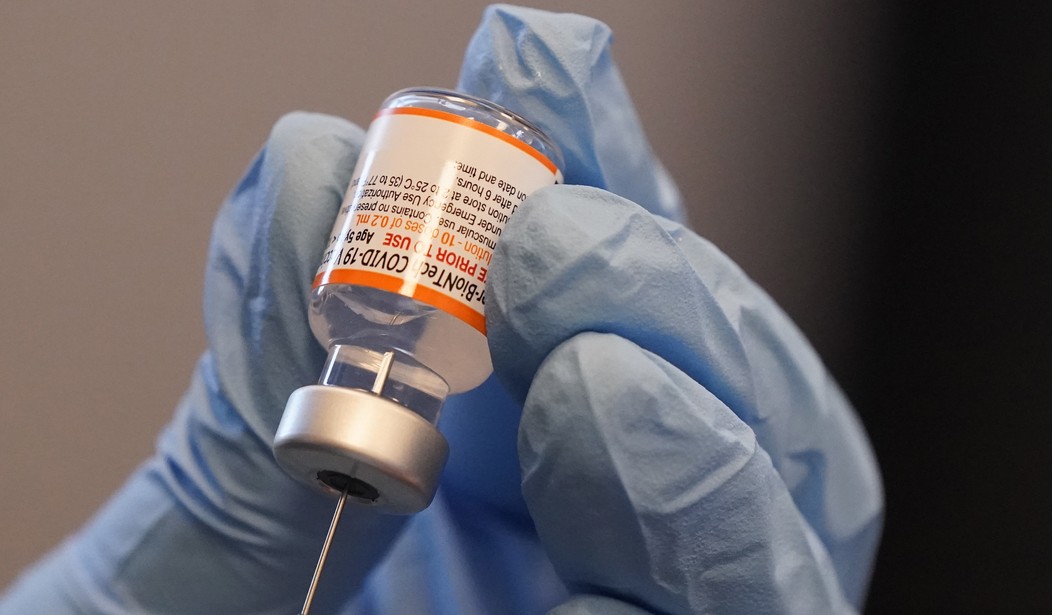A new study shows that experimental mRNA COVID-19 vaccines like the one produced by Moderna might actually make people more susceptible to infection over the long term.
The study has yet to be peer-reviewed and the pre-publisher notes that it should “not be used to guide clinical practice.” [Emphasis in the original.]
Still, this study and other recent data give more indication that COVID vaccines have been a multibillion-dollar example of overpromising and underdelivering.
Funded by the National Institutes of Health, the authors examined exclusively recipients of Moderna’s mRNA-1273 vaccine, aside from the unvaccinated control group.
Israel National News reported that scientists found that mRNA vaccines “may impair the body’s ability to produce a key type of antibody, thus potentially limiting the immune system’s defenses against mutated strains of the virus, a new study suggests.”
More:
Researchers also found a pronounced difference, however, in the levels of anti-nucleocapsid antibodies between vaccinated participants and members of the placebo cohort, even when the study controlled for viral load.
Trial participants who were given the placebo, rather than the vaccine, and became infected during the trial were found to have significantly higher levels of the neutralizing anti-nucleocapsid antibodies than vaccinated participants who had comparable viral loads.
Approximately 60% of participants from the placebo cohort who experienced very mild infection, with low viral loads, were found to have anti-nucleocapsid antibodies, compared to roughly 10% of vaccinated subjects.
Among those with higher viral loads – qualifying as mild cases, rather than very mild – 71% of the unvaccinated developed anti-nucleocapsid antibodies, compared to just 15% of those in the vaccine group.
TL;DR: Getting vaccinated might protect you better now but get you sicker later.
Vaccines, how do they work?
Then there’s this news from Portugal, one of the most vaccinated countries in the world:
7 months after Politico said vaccination rates were the key determinant of whether a country could keep case rates down, highly vaccinated Portugal, where ~95% of adults are fully vaccinated, has the highest case rate in the world and their highest case rate on record
Whoops pic.twitter.com/Km1VVg972C
— Ian Miller (@ianmSC) May 24, 2022
Portugal was about as fully vaccinated as can be by August of last year, yet the current spike there is the “highest case rate in the world and their highest case rate on record.”
That little underreported nugget certainly at least appears to dovetail with the NIH study.
It’s enough to make you wonder what the long-term effects of getting boosted every few months might be.
I got the double Pfizer jab — another mRNA vaccine — in the spring of 2021 for just two reasons.
The one that is germane to today’s was that I wanted to minimize the risk of spreading infection to my in-laws, both in their seventies. Research at the time indicated that being immunized did indeed reduce the risk of infecting others, probably due to the vaccinated carrying lower viral loads.
For their sake, I was more than willing to take a small chance.
Later research, however, showed that the benefit was short-lived. And while I still can’t seem to catch omicron (even though I want to), my fully vaxxed-and-boostered in-laws did catch it.
They’re fine, thanks for asking. Both enjoyed, as it were, mild cases and made full recoveries in short order.
But now the question must be asked: Did the mRNA vaccines they took over a year ago make their infections this spring more likely instead of less?
We need answers to these questions before we go around sticking needles in everyone’s arms three or four times each year.










